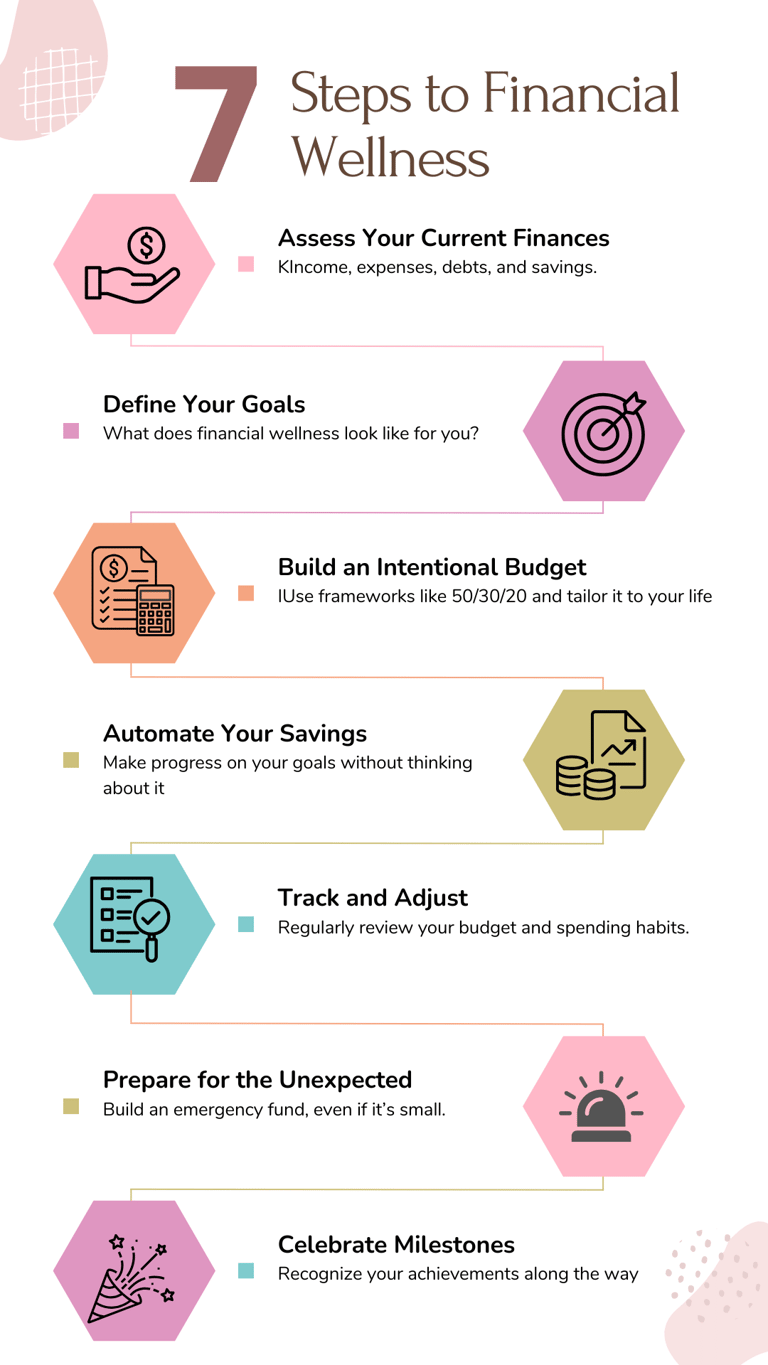Financial Wellness 101: Create a Budget That Brings You Peace
ORGANIZING


The idea of financial wellness often feels like an elusive goal—something reserved for people who have it all figured out. The reality, however, is that achieving peace with your finances isn’t about being perfect; it’s about creating systems that align your money with your values. It’s about taking control of your finances so they work for you, not the other way around.
In a world that constantly pushes us to earn more, spend more, and keep up with others, finding peace through financial planning can feel revolutionary. But it’s not just about saving more or spending less—it’s about designing a financial life that allows you to sleep better at night, pursue your passions, and show up as your best self in the world.
Let’s break it down into actionable steps so you can start building a budget that brings clarity, balance, and, most importantly, peace.
Why Financial Wellness is a Non-Negotiable
Financial stress doesn’t just impact your wallet; it affects nearly every aspect of your life. According to the American Psychological Association, money is consistently ranked as one of the top stressors in people’s lives, contributing to anxiety, sleep disturbances, and even physical health issues.
When you achieve financial wellness, you gain more than just a stable bank account. You gain freedom—the freedom to make decisions based on what you value rather than fear, the freedom to invest in yourself, and the freedom to live without constant worry about what’s next.
Step 3: Build a Budget That Reflects Your Values
A good budget isn’t about restriction—it’s about intention. The goal is to allocate your money in a way that aligns with your priorities and brings balance to your life.
The 50/30/20 Rule
This popular budgeting framework is a great place to start:
50% to Needs: Rent, utilities, groceries, transportation, and other essentials.
30% to Wants: Dining out, entertainment, hobbies, and non-essentials that bring joy.
20% to Savings and Debt Repayment: Emergency funds, retirement accounts, and paying down high-interest debt.
Tailor It to Your Life
While the 50/30/20 rule is helpful, it’s not one-size-fits-all. If you’re focused on paying off debt, for example, you might allocate more to that category and reduce spending elsewhere. The key is to make the framework work for your unique situation.
Step 4: Automate Your Financial Wellness
One of the easiest ways to stick to a budget is to automate it. Set up automatic transfers to your savings account, retirement fund, or investment portfolio. This ensures that your financial goals are prioritized before you even have the chance to spend that money elsewhere.
Automation isn’t just about convenience—it’s about building habits that align with your financial goals.
Step 1: Assess Where You Are Today
Before you can create a budget, you need a clear picture of your current financial situation. Think of this step as your financial GPS—figuring out where you are so you can map out where you want to go.
Start by gathering the following information:
Your Income: Include all sources, whether it’s a salary, freelance gigs, or passive income.
Your Expenses: Break these into categories—fixed expenses (like rent, utilities, and insurance) and variable expenses (like dining out, subscriptions, and shopping).
Your Debts: List every debt, from credit cards to student loans, along with their interest rates.
Your Savings: Know how much you have set aside for emergencies, retirement, and other goals.
This step might feel overwhelming, especially if you’ve been avoiding your finances. But remember: clarity is power. The simple act of writing everything down is a big step toward taking control.
Step 2: Define What Peace Means to You
Financial peace looks different for everyone. For some, it might mean having a robust emergency fund; for others, it’s about eliminating debt or saving for a dream trip. Take time to reflect on what financial wellness means to you.
Ask yourself:
What financial goals would make me feel secure?
What do I want to prioritize in the next year?
How do I want to feel when I think about money?
This is your “why,” and it will serve as your motivation when sticking to a budget feels challenging.




Step 5: Create a System for Tracking Progress
Building a budget is only half the battle; the real work comes in sticking to it. Tracking your spending and reviewing your budget regularly helps ensure you’re staying on course.
Use Budgeting Tools: Platforms like Simple Planning, or even a simple spreadsheet can help you monitor your finances in real-time.
Review Monthly: Set aside time each month to review your spending, celebrate wins, and identify areas for improvement.
Tracking isn’t about judgment—it’s about awareness. When you know where your money is going, you can make more informed decisions moving forward.
Freedom Through Financial Wellness
Creating a budget isn’t about deprivation—it’s about designing a life that feels intentional and aligned with your values. By taking small, consistent steps to manage your money, you can reduce stress, build confidence, and create a sense of peace that extends far beyond your finances.
So, take that first step. Write down your goals, build a plan, and trust that each small action brings you closer to the freedom and balance you deserve.


Step 6: Build a Cushion for the Unexpected
Life is unpredictable, and one of the best ways to achieve financial peace is by creating a safety net. Experts recommend having an emergency fund that covers 3-6 months’ worth of living expenses.
If saving that amount feels daunting, start small. Even setting aside $500 for unexpected expenses can make a huge difference in reducing stress.
Step 7: Celebrate Your Wins
Financial wellness is a journey, not a destination. Along the way, it’s important to acknowledge your progress. Paid off a credit card? Saved your first $1,000? Give yourself credit for those wins, no matter how small they might feel.
Celebrating milestones keeps you motivated and reminds you that your hard work is paying off—literally.


Willow & Linen
Embrace slow living and create cozy moments.
let's stay in touch
© 2024. All rights reserved.
